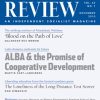Stephen Jay Gould’s Critique of Progress
A question of central importance in the interpretation of patterns of evolution is whether history had to turn out the way it did. From before Charles Darwin’s time up to the present it has been commonly assumed that history, both human history and the history of life in general, unfolded in a somewhat deterministic manner, that the present was inevitable, either ordained in Heaven or, in the scientific view, mechanically produced by deterministic natural laws. This view contrasts with that of the historian: that the quirks, chance events, and particularities of each moment make history, and that the world could have been other than it is.… The renowned paleontologist and evolutionary theorist Stephen Jay Gould.…developed a sophisticated and nuanced position that recognized both the importance of general laws and the role of contingency.… If contingency played little part in how history turned out, if the present was inevitable, then it makes little sense to challenge the status quo. However, if contingency dominates history, the future is open, and the world can be another way, as radicals of all varieties have long believed. | more…
States of Exception—Haiti’s IDP Camps
According to the Italian philosopher Giorgio Agamben, camps—for example, concentration camps, refugee camps, and internally displaced persons (IDP) camps—risk replacing nation-states as the most representative political spaces of our time. Agamben’s definition of “the camp” includes extra-judicial detention centers such as Guantánamo Bay; airport hotels that hold would-be immigrants awaiting deportation; the marginalized, segregated outskirts of Europe’s large cities; and even gated communities in the United States, with their private security firms and individualized “laws” that govern entry and exit. What all these spaces share is the suspension of national, territorial law and its replacement by police power. Those who reside in these legal dead zones are no longer “citizens”; they live in a state of exception to the law of the land—”exceptions” that are becoming more and more the rule.… Haiti’s IDP camps are indeed “states of exception” that risk becoming permanent fixtures in the post-earthquake urban landscape in and around Port-au-Prince. | more…
Is There Anything More to Say About the Rosenberg Case?
For more than forty years, defenders of the Rosenbergs have offered an argument unchanged in its essentials. The prosecution obtained the ultimate punishment…[—and that] punishment…was disproportionate and barbaric. However, the Rosenbergs’ defenders now concede that “Julius Rosenberg, code-named ‘Antenna’ and later ‘Liberal,’ had worked as a spy for the Soviet Union.”… The reason for this turnaround is that in 1995 the federal government made public a series of cables, referred to as the “Venona” messages, which were exchanged between the Soviet government and its operatives in the United States during and after the Second World War.… At the end of the play [Waiting for Lefty] a man runs up the center aisle carrying important information that the title character has been killed. These days, I want to shout out to the audience, as did that man, but with a different message. My imagined dramatic scene goes as follows. “Wait, wait!… Listen to me. Please listen.… You’ve heard the Thesis of the defense. You’ve heard the Antithesis of the prosecution. Don’t you want to hear the Synthesis?” | more…
On Nuclear Power
Monthly Review has long been on record as opposed to the expansion of nuclear energy. Most recently, some of the dangers of nuclear power, both in its present form and with continuing new technological developments, were spelled out by Robert D. Furber, James C. Warf, and Sheldon C. Plotkin of the Southern California Federation of Scientists, in their article on “The Future of Nuclear Power” (MR, February 2008).… The following correspondence consists of a letter from Brian Lindquist, Walt McCarron, Robert D. Furber, and Sheldon C. Plotkin associated with the Southern California Federation of Scientists, writing in response to John W. Farley’s review, in the September 2010 issue of MR, of James Hansen’s Storms of My Grandchildren. This letter and Farley’s response offer two widely divergent perspectives on this critical issue. | more…
Greed beyond Avarice
H. Rae Aston is a sculptor, poet, and former journalist. He lives on the shore of the Mille Îles River, north of Montreal, and has been for most of his life an advocate and fighter for socialist governance. Those efforts continue. | more…
Cannabis Goes Communist
Anarcho Grow Pura Vida in Costa Rica is a modern story that carefully blends author T.A. Sedlak’s knowledge of Costa Rica and cannabis cultivation with socialist ideals in an American capitalist dominated world.… Protagonist Ben Starosta travels through Latin America under the guise of teaching English while helping small agrarian communities develop illicit crops and reach new markets. His expertise in the risky cannabis trade funds community projects like schools and libraries, and earns him the loyalty of the communities he helps. Tension builds, as his dedication to the people is viewed as dangerous criminal activity by the CIA agents assigned to his case. | more…

January 2011 (Volume 62, Number 8)
In November, Fred Magdoff traveled to Shanghai with his wife, Amy Demarest, to attend the Marxism and Ecological Civilization conference at Fudan University (see the Review of the Month in this issue). Here are some reflections from Fred about the conference, Shanghai, and China, past and present | more…
Ecological Civilization
Given the overwhelming harm being done to the world’s environment and to its people, it is essential today to consider how we might organize a truly ecological civilization—one that exists in harmony with natural systems—instead of trying to overwhelm and dominate nature. This is not just an ethical issue; it is essential for our survival as a species and the survival of many other species that we reverse the degradation of the earth’s life support systems that once provided dependable climate, clean air, clean water (fresh and ocean), bountiful oceans, and healthy and productive soils.… There are numerous ways to approach and think about the enormous harm that has been done to the environment. I will discuss the following: (1) the critical characteristics that underlie strong ecosystems; (2) why societies are not adequately implementing ecological approaches; and (3) how we might use characteristics of strong natural ecosystems as a framework to consider a future ecological civilization | more…
Capitalism and Degrowth: An Impossibility Theorem
[A]lmost four decades after the Club of Rome raised the issue of “the limits to growth,” the economic growth idol of modern society is once again facing a formidable challenge. What is known as “degrowth economics,” associated with the work of Serge Latouche in particular, emerged as a major European intellectual movement in 2008 with the historic conference in Paris on “Economic De-Growth for Ecological Sustainability and Social Equity,” and has since inspired a revival of radical Green thought, as epitomized by the 2010 “Degrowth Declaration” in Barcelona.… Ironically, the meteoric rise of degrowth (décroissance in French) as a concept has coincided over the last three years with the reappearance of economic crisis and stagnation on a scale not seen since the 1930s. The degrowth concept therefore forces us to confront the questions: Is degrowth feasible in a capitalist grow-or-die society—and if not, what does this say about the transition to a new society? | more…
Continuing Sources of Marxism
In 1913 Lenin identified three intellectual sources of Marxism: German philosophy, English political economy, and French utopian socialism—each in turn created in the social conditions of their societies. But the process did not end there. Marxism continues to grow and to learn from the most advanced, liberating ideas of each period. (It is also influenced in negative ways, narrowing its horizons and getting dragged along by fashion in times of defeat). Here, I want to identify four contemporary sources of enrichment of Marxism: ecology, feminism, national/racial struggles, and pacifism. It is important to recognize them as sources of ideas, not only as allies in political struggles. Their interaction with Marxism is, of course, different from the pre-Marxist sources. They come to Marxism from the outside, but from an outside already influenced in part by Marxism, and they are both welcomed and resisted. | more…
Water—On Women’s Burdens, Humans’ Rights, and Companies’ Profits
How is it possible that a person living in a water-rich region uses more water by flushing the toilet than a person in a water-scarce region has available for drinking, food-preparation, hygiene, and cleaning—for a whole day? How is it possible that a woman living in a water-rich region only needs to open the tap to get enough water for herself and her family, while a woman in a water-scarce region has to…walk for miles and miles to get far less water of much worse quality? Why is that so? Is it bad fortune? Unfair? Destiny? Undeserved? Is it unjust? It is all these, but also much more. Water is the essence of life. It is the precondition of life.… This article has two parts. The first deals with dominant positions concerning water: the neoliberal agenda, consequences of water privatization, and the UN stance. The second part looks at what is missing in this picture and ignored by the dominant perspectives—namely, global inequalities and gender discrimination. | more…
Heinberg’s New Coal Question
Coal today lies at the very center of the world predicament over the future of energy and the climate. An indication of this can be found in the November 18, 2010, issue (vol. 468) of the leading scientific journal Nature, which includes an article by Richard Heinberg and David Fridley entitled “The End of Cheap Coal.” The article opens with the startling words: “World energy policy is gripped by a fallacy—the idea that coal is destined to stay cheap for decades to come.” What follows is a short, dramatic discussion of problems (geological, economic, and environmental) constraining future coal production and consumption. Heinberg and Fridley’s argument here has been developed more extensively in Heinberg’s recent book Blackout: Coal, Climate, and the Last Energy Crisis, which provides us with yet another indication of the momentous challenge and burden of our historical time. | more…

December 2010 (Volume 62, Number 7)
On October 16, MR editor John Bellamy Foster attended a lecture in Eugene, Oregon given by James Hansen, director of NASA’s Goddard Institute for Space Studies. Hansen is the leading U.S. climatologist and the world’s foremost voice for carbon emissions reductions. According to Hansen, we are facing two major tipping points associated with climate change: (1) ice sheet disintegration in Antarctica and Greenland, leading to a massive global sea level rise; and (2) a sudden acceleration in species extinction rates (already 100 to 1,000 times the preindustrial “background rate”), as climate zones begin to move much faster than species can move in response.… Hansen’s message was clear: the future of the planet will be in many ways determined by what we do “in the next several years.” This, he insists, is not a problem to be left to the next generation, since we “could create a situation out of the control of young people by the time they become adults.” | more…